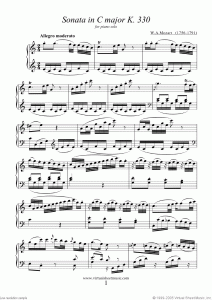Wolfgang Wunderkid
Listen to the Recess! Clip
| Author | John Cech |
| Air Date | 1/27/2000 |

Mozart’s First Transcript
Brief Sound Clip
You’re hearing part of the first composition by the world’s most astonishing musical genius, Wolfgang Amadeus Mozart. The little Mozart was between five and six years old when he wrote this. His father, Leopold, a court musician in Salzburg, Austria, copied it down, as he did many of his son’s first compositions, until the boy could write himself.
Little Wolferl, as he was called, began to show his musical gifts at four, when he started teaching himself to play by ear the music that his sister, Nannerl, who was five years older, was learning for her keyboard lessons. He took up the violin when he was six, and by seven he was playing the organ–standing up–because he couldn’t touch the pedals sitting down.
When Wolferl was about six, his father took the little boy and and his sister, the only two of the Mozart children to have survived beyond infancy, on their first tour of the courts of Europe where Leopold hoped that they would be well paid for the musical shows that he had arranged for them to put on together. Certainly they were welcomed; the word quickly spread about the young prodigy, and he was soon the darling of the courts. He was small and delightful, a gifted improviser. Among the many astonishments he presented were his uncanny ability to finish a composition that someone else had started, and his ear for mimicking all the hits of the day. Even the Empress Maria Theresa was so pleased with his performance that she allowed him to sit on her lap, put his arms around her neck and kiss her. Kings greeted him effusively, Queens fawned over him and fed him with their own royal fingers from their own plates.
Papa Mozart knew that the magic, even of such a prodigy as his son, would wear off once the boy had grown, and so he toured with the children incessantly, often for a year at a time, hoping to cash in on his son’s celebrity. But the trips weren’t without their price: Wolferl had rheumatic fever twice; typhoid, which nearly killed him, at nine; and a touch of small pox at 11. One doctor who observed him did not think that he would live long.
Yet he did survive his childhood, and each year as he became less a child prodigy, his musical talents only grew. By the time he was eight, just two years after he’d begun, he was already writing sonatas like this. It was, as his father said, “a miracle.”
Brief Sound Clip